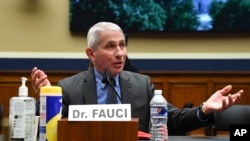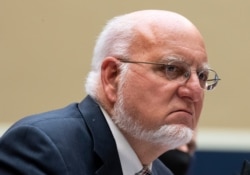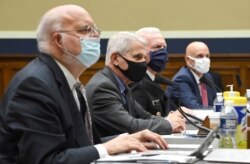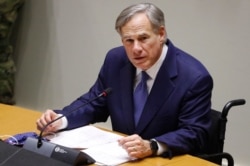As crowds gathered at a rally for President Donald Trump in Phoenix, Arizona, the nation's top infectious disease doctor called the gathering a bad idea.
"I'll say it yet again. You should not congregate in crowds," Dr. Anthony Fauci, head of the National Institute of Allergy and Infectious Diseases, said Tuesday.
Since the beginning of the COVID-19 pandemic, health officials have advised people to avoid large gatherings in order to cut down on the spread of the coronavirus that causes the disease.
"Even though many people, for a variety of reasons, do not listen to the — not suggestion, but plea — to not congregate in crowds, some people are going to do that anyway," Fauci said at a House Energy and Commerce Committee hearing.
"If you do, please wear a mask," he said.
Although scientists do not know the "exact percentage" of protection that masks provide, "we can say very clearly that wearing a mask is definitely helpful" to prevent both catching and spreading the virus, Fauci said.
Trump told The Wall Street Journal recently that some people wear masks to "signal disapproval" of him.
Fauci said progress against COVID-19 is a "mixed bag" across the country. While new cases have fallen in and around New York City, which was the epicenter early in the outbreak, Fauci noted a "disturbing surge" in states including Texas, Florida and Arizona, where the president's rally took place.
The event is Trump’s second in four days. At a rally in Tulsa, Oklahoma, last Saturday, the president said he had asked his administration to slow down coronavirus testing because more testing would reveal more cases.
But Fauci and other members of the White House Coronavirus Task Force on the House panel said they have not been instructed to do so.
"To my knowledge, none of us have ever been told to slow down on testing. That is just a fact. In fact, we will be doing more testing,” Fauci said.
The task force members all said they expect COVID-19 infections to increase in the fall as influenza season picks up.
U.S. Centers for Disease Control and Prevention chief Robert Redfield said the agency has developed a test that will check for the coronavirus and two types of influenza virus simultaneously.
"As we get to the fall, we're going to have influenza and COVID at the same time," Redfield said. The new test will help doctors distinguish between two deadly illnesses with similar symptoms.
"This fall and winter is going to be difficult, and we need to prepare for it," Redfield said.
Fauci said he was "cautiously optimistic" that one of several vaccines under development would be ready as soon as January. The federal government has signed hundreds of millions of dollars’ worth of contracts for companies to scale up manufacturing while vaccines are still in clinical testing.
"We're going to be making doses even before we know it's effective," he said. The goal is to save time without sacrificing the necessary tests for safety and effectiveness.
"If you lose, the only thing you lose is a lot of money," Fauci said. "Nobody likes to lose a lot of money, but we feel we'd rather lose a lot of money and gain four, five, six, seven months than have a result and have to wait four, five, six, seven months to get the vaccine."
The U.S. leads the world in coronavirus infections, with more than 2.3 million of the more than 9.1 million cases worldwide, according to statistics compiled by the Johns Hopkins University Coronavirus Resource Center. The U.S. is also the world leader in confirmed COVID-19 deaths, with more than 120,670.
Food and Drug Administration chief Dr. Stephen Hahn and Adm. Brett Giroir, head of the U.S. Public Health Service, also testified.
Fauci is among the health experts saying people should not be focused on a second wave of the virus in the U.S. because the country has not yet emerged from its first wave.
It’s a serious situation, Fauci told lawmakers.
“Right now, the next couple of weeks are going to be critical in our ability to address those surges that we are seeing in Florida, Texas, Arizona and in other states,” he said.
Many states are in the process of loosening restrictions put in place to stop the spread of the virus, despite infection spikes in about half of the 50 U.S. states.
Texas Gov. Greg Abbott said Monday that reimposing restrictions would be a last resort, while acknowledging the virus was spreading at an “unacceptable rate” and declining to impose an order to mandate the use of masks in public.
Texas has set daily records for new infections for nearly two weeks as its hospitalization rates climbed.
Neighboring Louisiana surpassed 3,000 deaths due to the coronavirus, and with a rise in cases there as well, Gov. John Bel Edwards said he would keep in place the current limitations that were set to expire Friday.
Hospitalization rates have also surged in Georgia, while the number of confirmed cases is rising in more than a dozen states.








